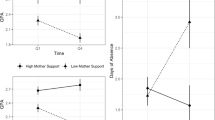Abstract
Family support was examined as a mediator of the relation between interparental conflict and adolescent academic achievement. Results indicated that two dimensions of family support, family cohesion and parent–school involvement, mediated the relation between interparental conflict and academic achievement. The results further suggested that family support was more likely to function as a mediator for girls than for boys. Lastly, in the presence of a mediating effect, a direct path remained between interparental conflict and grade point average.
Similar content being viewed by others
REFERENCES
Baron, R. M., & Kenny, D. A. (1986). The moderator-mediator variable distinction in social psychological research: Conceptual, strategic, and statistical considerations. Journal of Personality and Social Psychology, 51, 1173–1182.
Bentler, P. M. (1992). EQS structural equations program manual. Los Angeles: BMDP Statistical Software.
Buehler, C., Anthony, C., Krishakumar, A., Stone, G., Gerard, J., & Pemberton, S. (1997). Interparental conflict and youth problem behaviors: A meta-analysis. Journal of Child and Family Studies, 6, 233–247.
Bush, D. M., & Simmons, R. (1987). Gender and coping with the entry into early adolescence. In R. C. Barnett, L. Biener, & G. K. Baruch (Eds.), Gender and stress (pp. 185–218). New York: Free Press.
Cummings, E. M., & Davies, P. (1994). Children and marital conflict. New York: Guilford Press.
Davies, P. T., & Windle, M. (1997). Gender-specific pathways between maternal depressive symptoms, family discord, and adolescent adjustment. Developmental Psychology, 33, 657–668.
Demo, D. H., & Acock, A. C. (1996). Family structure, family process, and adolescent well-being. Journal of Research on Adolescence, 6, 457–488.
Ebata, A. T., & Moos, R. H. (1994). Personal, situational, and contextual correlates of coping in adolescence. Journal of Research on Adolescence, 4, 99–125.
Fauber, R., Forehand, R., Thomas, A. M., & Wierson, M. (1990). A mediational model of the impact of marital conflict on adolescent adjustment in intact and divorced families: The role of disrupted parenting. Child Development, 61, 1112–1123.
Feldman, S. S., Fisher, L., & Seitel, L. (1997). The effect of parents' marital satisfaction on young adults' adaptation: A longitudinal study. Journal of Research on Adolescence, 7, 55–80.
Fincham, F. D. (1994). Understanding the association between marital conflict and child adjustment: Overview. Journal of Family Psychology, 8, 123–127.
Forehand, R., Biggar, H., & Kotchick, B. A. (1998). Cumulative risk across family stressors: Short-and long-term effects for adolescents. Journal of Abnormal Child Psychology, 26, 119–128.
Forehand, R., & McCombs, A. (1989). The nature of interparental conflict of married and divorced parents: Implications for young adolescents. Journal of Abnormal Psychology, 17, 238–249.
Forehand, R., Neighbors, B., Devine, D., & Armistead, L. (1994). Interparental conflict and divorce: The individual, relative, and interactive effects on adolescents across four years, Family Relations, 43, 387–393.
Garbarino, J. (1985). Adolescent development: An ecological perspective. Columbus: Charles E. Merrill Publishing Co.
Gonzales, N. A., Cauce, A. M., Friedman, R. J., & Mason, C. A. (1996). Family, peer, and neighborhood influences on academic achievement among African-American adolescents: One-year prospective effects. American Journal of Community Psychology, 24, 365–387.
Gore, S., Aseltine, R. H., Jr., & Colton, M. E. (1993). Gender, social-relational involvement, and depression. Journal of Research on Adolescence, 3, 101–125.
Grolnick, W. S., & Slowiaczek, M. L. (1994). Parents' involvement in children's schooling: A multidimensional conceptualization and motivational model. Child Development, 65, 237–252.
Hickman, C. W., Greenwood, G., & Miller, M. D. (1995). High school parent involvement: Relationships with achievement, grade level, SES, and gender. Journal of Research and Development in Education, 28, 125–134.
Hines, A. M. (1997). Divorce-related transitions, adolescent development, and the role of the parent-child relationships: A review of the literature. Journal of Marriage and the Family, 59, 375–388.
Keith, T. Z. (1991). Parent involvement and achievement in high school. In S. B. Silvern (Ed.), Advances in reading/language research: A research annual: Vol. 5. Literacy through family, community and school interaction (pp. 125–141). Greenwich, CT: Jai Press, Inc.
Kerr, D. (1985). Social development model questionnaire. Unpublished manuscript, University of Washington at Seattle.
Laursen, B. (1995). Conflict and social interaction in adolescent relationships. Journal of Research on Adolescence, 5, 55–70.
Olson, D. H. (1982). Family satisfaction. St. Paul, MN: University of Minnesota.
Roberts, R. E., Roberts, C. R., & Chen, Y. R. (1997). Ethnocultural differences in prevalence of adolescent depression. American Journal of Community Psychology, 25, 95–110.
Ruetter, M. A., & Conger, R. D. (1995). Antecedents of parent-adolescent disagreements. Journal of Marriage and the Family, 57, 435–448.
Singh, K., Bickley, P. G., Keith, T. Z., Keith, P. B., Trivette, P., & Anderson, E. (1995). The effects of four components of parental involvement on eighth-grade student achievement: Structural analysis of NELS-88 data. School Psychology Review, 24, 299–317.
Steinberg, L., Brown, B. B., & Dornbusch, S. M. (1996). Beyond the classroom. New York: Simon & Schuster.
Violato, C. (1995, August). Structural equation modeling: A nontechnical approach. Workshop presented at the Annual Convention of the American Psychological Association, Washington, DC.
Watt, N. F., Moorehead-Slaughter, O., Japzon, D. M., & Keller, G. G. (1990). In J. Rolf, A. S. Masten, D. Cicchett, K. H. Naechterlein, & S. Weintraub (Eds.), Risk and protective factors with the development of psychopathology (pp. 281–303). Boston, MA: Cambridge University Press.
Wenz-Gross, M., Siperstein, G. N., Untch, A. S., & Widaman, K. F. (1997). Stress, social support, and adjustment of adolescents in middle-school. Journal of Early Adolescence, 17, 129–151.
Wierson, M., & Forehand, R. (1992). Family stressors and deficits in adolescent functioning: A consideration of models for early versus middle adolescence. Behavior Therapy, 23, 671–688.
Wierson, M., Forehand, R., Fauber, R., & McCombs, A. (1989). Buffering young male adolescents against negative parental divorce influences: The role of good parent-adolescent relations. Child Study Journal, 19, 101–115.
Author information
Authors and Affiliations
Rights and permissions
About this article
Cite this article
Unger, D.G., McLeod, L.E., Brown, M.B. et al. The Role of Family Support in Interparental Conflict and Adolescent Academic Achievement. Journal of Child and Family Studies 9, 191–202 (2000). https://doi.org/10.1023/A:1009419005136
Issue Date:
DOI: https://doi.org/10.1023/A:1009419005136




